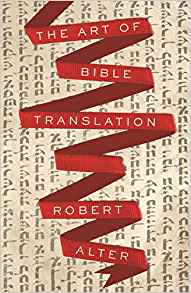 Robert Alter, The Art of Bible Translation (Princeton: Princeton University Press, 2019), 127pp.
Robert Alter, The Art of Bible Translation (Princeton: Princeton University Press, 2019), 127pp.
When I was in seminary thirty-five years ago, I took one year of Hebrew for my Masters of Divinity degree. Hebrew was especially hard, with its exotic alphabet and text that read from right to left. I've forgotten my Hebrew, but there's a phrase from the second verse in the Bible that I learned back then that I couldn't forget if I tried. Genesis 1:2 reads that the primordial soup of pre-creation was tohu wa-bohu. That was fun to say out loud as a student — it rhymed, it was phonetically simple, and it was one of the few things that I could pronounce without mangling the language.
Genesis 1:2 is only one of many dozens of examples that Robert Alter gives to argue that the theological message of the Bible comes to us in a decidedly literary medium. In this case, we see "sound play" at work, where the second term "phonetically mirrors" the first term, "suggesting how in the moment before the ordering acts of creation, everything was intermingled." And so in his own landmark translation (below), he substitutes alliteration for rhyme, using "welter and waste."
By the time that Alter (born 1935) finished grad school at Harvard in 1962, he had three degrees in English and comparative literature. Those were the fields of his earliest scholarly expertise. Later, he turned to the translation of the Hebrew Bible, beginning with The Art of Biblical Narrative (1981), and culminating in his award-winning 2018 publication of the entire Hebrew Bible. The project took twenty years, and reflects the single most important point of this book: that a strong philological background is not sufficient by itself to make a good translation. Rather, a translator must be sensitive to the many literary aspects of the Hebrew text —word play (cf. puns), word choice, diction, rhythm ("the beating heart of literary prose"), rhyme, syntax, narrative point of view, and so forth. These are not mere ornamentation, says Alter, they are keys to rightly understanding the Bible.
In Alter's view, translators too often have a "rage to explain the text," and an "impulse for clarification," rather than letting the simple but subtle Hebrew stand on its own. They have been tone deaf to matters of literary style (in both the source and target languages). "My own contention is that meaning in the Bible or in any literary text cannot be reduced to lexical values, that it involves the communication of affect and can never be separated from the nuanced connotation of words and their dynamic interaction as they are joined through sound, through syntax, and through poetic or narrative context." This book was a joy to read: an important subject, by an eminent scholar, in a concise fashion, for a general readership.
Robert Alter has been professor of Hebrew and comparative literature at the University of California, Berkeley, since 1967.
Dan Clendenin: dan@journeywithjesus.net


